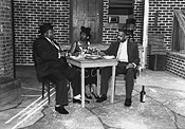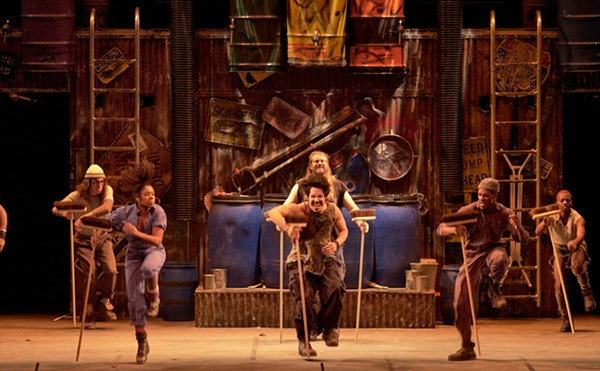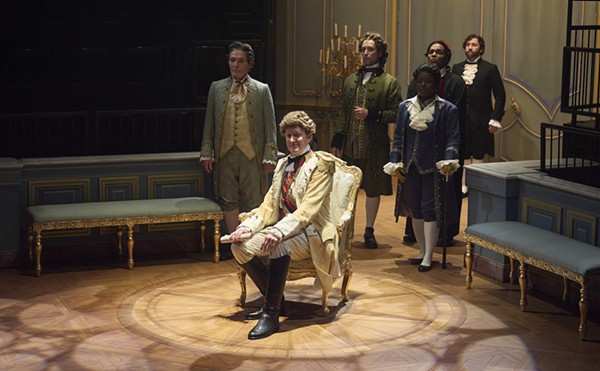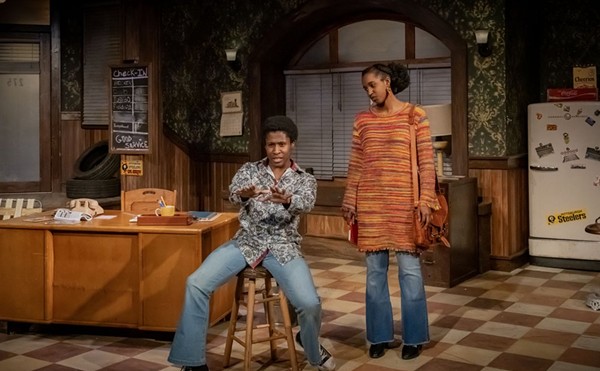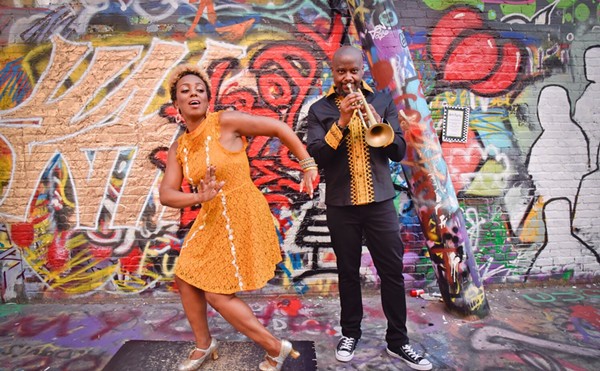In Two Trains Running, his most insouciant work, now wowing them at the Cleveland Play House, he slyly turns the urban renewal of a neighborhood into the beautification of a soul. In Joe Turner's Come and Gone, his most powerful play, he imagines a boardinghouse as a spiritual way station for an exodus of ex-slaves. Coming up at Beck Center is the third Wilson play to be done this season in Cleveland, Fences, an expansive nod to Arthur Miller's warring fathers and sons.
Wilson's Seven Guitars, now at Karamu House, is set in a backyard in Wilson's perennial Pittsburgh. Told in flashback, the play spins with the mournful wail of an old blues record, singing of the doomed path of Floyd "Schoolboy" Barton. The play, which commences after his death, thrusts us into a dreamlike netherworld. Just after his funeral, on a porch on a summer afternoon, the gathered friends talk about seeing angels out there at the cemetery: "He came right out of his casket, and they all floated up in the sky."
The play then flashes back to pick up on Floyd, as he tries to reclaim his life and career after a stint in a Chicago workhouse. Offered the opportunity to make a record, he must first get his guitar out of hock, put back together his band, and woo his betrayed girlfriend out of the deep freeze and back into his arms.
This is another in Wilson's wildly ambitious cycle concerning the struggles of African Americans in each decade of the 20th century. The only other playwright who ever attempted anything of this magnitude is Eugene O'Neill. Appropriately, Wilson grafts this episode, set in the 1940s, to film noir archetypes: the doomed romantic anti-hero; the psychotic, deranged, child-like menace; the true-blue sweetheart; the tart-tongued wise sister, friend of the heroine; the irresistible hellcat, a child of nature, who brings out the primal mating urge in every man she encounters. A group of wised-up jazz hipsters are trying to shoot down the devil, outlive their hard luck, and catch that liberating express train to fame and success in Chicago.
Here is a theatrical sausage stuffed to bursting with an overabundance of spices. Its three hours of symbolism and emotional battery can cause those timid souls with faint hearts and TV-decimated attention spans to reach first for the Pepcid AC, then for the exit.
Wilson sends the history of black America crashing down on our heads. We have a searing account of what happens when an oppressed people, confined over the decades, snaps. In a central scene, the impassioned musician and his cohorts gather to jubilate as, on the radio, Joe Louis, "The Brown Bomber," brings down a lily-white opponent. "The black man hits hard, you know," echoes against the bricks of the backyard. "This is how you do the "Joe Louis Victory Walk'" commences a dance of liberation. Here we see black pride rising. Suddenly comes the day that Amos and Andy got their walking papers, when Beulah refused to peel one more grape for Mae West, and Jack Benny had to learn to serve himself.
Karamu's Seven Guitars is a mixed blessing. The spirit is willing, but the flesh is often weak. Richard H. Morris Jr.'s evocative set conjures up the backyard where our grandmothers learned to play jacks. Thankfully, Director Caroline Jackson-Smith, with the aid of Assistant Director Tony Sias, eschews her usual deadly pacing for a varied, healthy gallop (though her blocking works on the order of a military drill, sending everyone front and center to deliver their speeches). She renders what calls for oil paint hues and precision with the pleasing but wan vagueness of watercolors. Only Saundra Holmes's honky-tonk hairdresser and Charles Robinson's cut-up come to an appropriate boil. L. Arrington Bay's Jamaican menace is about as threatening as a mewing kitten, and Kelvin Willingham's Floyd seems to disappear into his '40s pinstripes.
Even a faded approximation of Wilson's folk art is not to be missed. The playwright best summed up his own magic when he wrote: "I have tried to extract some measure of truth . . . The content of my mother's life, her myths, her superstitions, her prayers, the contents of her pantry, the smell of her kitchen, the song that escaped from her sometimes parched lips, her thoughtful repose, and present laughter are all worthy of art: hence, Seven Guitars."

